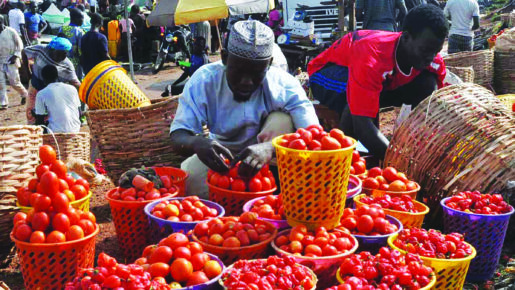As the cost of food items continues to climb, tomato traders in Badagry, Lagos State, voice concerns about diminishing profits. This reveals a significant surge in the price of tomatoes, with a basket skyrocketing from N5,000 to N23,000 over recent months.

Mrs. Suleiman, a trader at Agumo market, attributes this sharp increase to rising transportation expenses incurred in bringing the produce from farms to markets. She explains how the escalating fuel prices have led to higher costs at each stage of the supply chain, ultimately burdening this tomato traders with inflated prices.
Another trader, Senami, laments her inability to afford a full basket of tomatoes due to the relentless price hikes. She now settles for purchasing smaller quantities, reflecting the challenging market conditions.
Mr. Pius Ahusimenre, a retail trader, emphasizes that the problem extends beyond tomatoes, affecting various agricultural products. He highlights the dependence on imports for essential farming resources, which exacerbates the situation by driving up costs in tandem with the fluctuating naira-to-dollar exchange rate.

Addressing potential solutions, Ahusimenre calls for government intervention to support local farmers with access to machinery and financial assistance. He believes that empowering farmers in this manner would enhance productivity and mitigate the impact of transportation challenges and import dependence.
Meanwhile, farmer Mr. Daniel underscores the role of climate change in disrupting tomato production, particularly during periods of inadequate rainfall. He describes the struggles faced by small-scale farmers, who lack the resources to invest in irrigation systems or employ additional labor.
Daniel also criticizes the stringent requirements for obtaining loans, which often deter farmers from seeking financial support. He highlights the disparity in access to assistance, lamenting the lack of support reaching those in remote rural areas like his.
Conclusion

Tomato traders
The plight of tomato traders in Badagry brought broader systemic challenges within the agricultural sector, including transportation constraints, import dependence, climate change vulnerabilities, and limited access to financial resources and support programs for small-scale farmers.
Source: guardian.ng











